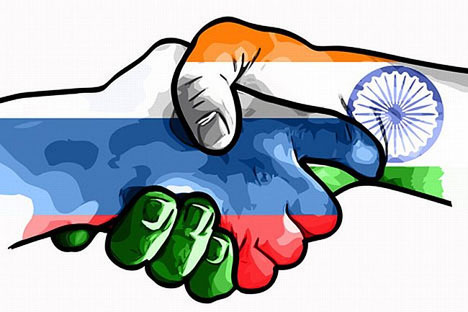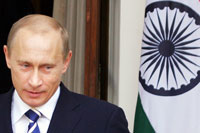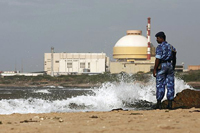Whither India-Russia partnership

Photo: Free Source
The India-Russia partnership is perhaps not at its best phase as recent developments unravel. That should not cause disappointment in policy circles and among protagonists of strong relations; rather it should lead to soul searching which in turn can help bring relations on rail.
The Kudankulam conundrum, the Sistema issue, the dithering pace of arms deals point that all is not well in relations. The current developments tilt the balance in favour of pessimism. Though President Putin might have had enough reasons to delay his visit to India, the recent developments motivate analysts to attribute other reasons which may not stand scrutiny.
The initial years after the collapse of the Soviet Union gave rise to similar kinds of pessimism in bilateral relations, though the relations geared up within a span of two years with the Yeltsin visit. The pertinent question is: can the relations bounce back, and terms like strategic partnership, all-weather friendship gain true meaning in India-Russia relations?
There are many factors that affect the relations. India, since the past two decades, has evolved the culture of coalition politics, which accommodate diverse regional interests at the power centre. While coalition politics may be a viable option to manage domestic politics, its import for international politics has not been desirable always. In a federal polity like that of India where states wield substantial power, the foreign policy created at federal level may be jeopardised at the whims of regional satraps. In many cases the regional leaders keep in mind their partisan interests and pay scant attention to the nation’s foreign policy and credentials.
It is no surprise as news reports flashed that the regional leaders of Tamil Nadu played chameleon in the context of Kudankulam nuclear plant. It is well documented how the same leaders supported the plant as a symbol of growth, and opposed the plant as anti-progress and anti-people, depending on their equations with Delhi. This generated frustration not only in Delhi, but also in Moscow. New Delhi under Manmohan Singh followed the compulsions of coalition politics, and as a result a lot of unnecessary mist covered the plant. The lack of decisive leadership at the centre further contributed to this precarious scenario. Russian frustration is understandable. To put simply, why cannot there be a coherent policy by India on nuclear energy, which can be pursued single mindedly disregard of coalition compulsions?
Last week the West Bengal government cancelled the proposal to build nuclear plants with Russian cooperation at Haripur in East Midnapur district. Why now? The proposal was on table for the past few years. As far as the West Bengal’s ruling political party Trinmool Congress was a part of the coalition government at the centre, things were moving smooth. After the party pulled out from the coalition government, Kolkata could realise that the plant is anti-people. While the Trinmool Congress was part of the coalition government, the plant was not anti-people. Such developments further cloud the relations, and give rise to frustration as if the whole machinery of government is inept and unable to develop a coherent national policy. The Indian government attempted to downplay the development and External Affairs Ministry spokesperson stated, “I do not know whether abandon is the right word. We have been in consultation with our Russian friends on this and there are some technical issues that have come to the fore and we are working with them on finding another site.” While Trinmool Congress may derive satisfaction at scoring another point against Manmohan Singh government which appears scary at the prospects of general election this year, the larger national interest gets a low key attention.
There seems to be a lack of direction, particularly in the context of India-Russia relationship. When Putin spearheaded the campaign to boost the relationship, and orchestrated the strategic partnership in 2000, it was expected that the bonhomie will have policy implications in coming years. The intergovernmental commissions, joint working groups, declarations on terrorism, multi-polarism, and annual summit level meetings raised the bar of expectations. After twelve years of strategic partnership the signs are not that healthy. The prevarications of coalition politics, a smug pride in India’s growth story, and lack of strong leadership at New Delhi have contributed to this debilitating scenario.
Issues like delays in delivery of Admiral Gorshkov further strengthen the constituency of detractors. I do not argue that India should not promote its national interest, or Russia should not promote its national interest, and in the emerging world order both should not explore opportunities to meet national requirements, my central argument in this piece is India lacks a strong decision making environment, rampant corruption plague the system of administration, clinging to power is a virtue than to transparent administration. When regional leaders threaten to withdraw support New Delhi baulks and does not hesitate to underplay issues of national interest. There are no doubt controversial issues, but they must be dealt with adept diplomacy rather than dithering approach or ad hoc maneuvering.
Putin’s postponement of visit should not be a big surprise. The Russian Government did not cancel the visit. All the visits by Russian leaders to participate in annual summit after 2000 have taken place in December. The Indian spokesperson rightly pointed out, “The dates are peripheral to the substance in the relations.” One and half month interregnum may not be a spoiler in relations, but it provides enough time to build the dilapidated relations. The areas of cooperation are indeed immense ranging from nuclear energy, arms deals, terrorism and extremism, peace and stability in Afghanistan and Central Eurasia, oil and gas. It is time to checkmate the downward spiral in relations so that the annual summit can have some true meaning with policy significance, than being a mere photo-up among high dignitaries of the two countries.
The imminent issues such as Kudankulam nuclear plant and Sistema must be taken up in right earnest and resolved. One hopes by the time President Putin comes to India in December the cordiality in relations returns back.
The writer is an Indian commentator. His areas of interests include India-Russia relations, conflict and peace, and strategic aspects of Eurasian politics.
All rights reserved by Rossiyskaya Gazeta.
Subscribe
to our newsletter!
Get the week's best stories straight to your inbox


